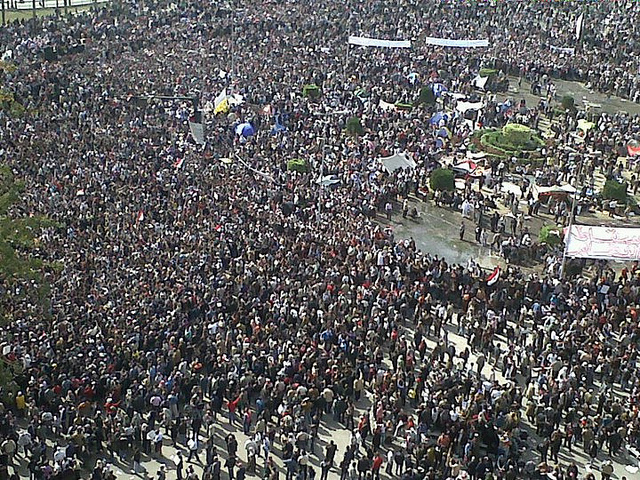In early August, Egypt made international headlines once again for excluding its critics when a Human Rights Watch (HRW) delegation was denied entry into the country.
HRW’s executive director, Kenneth Roth, and Middle East and North Africa director, Sarah Leah Whitson arrived in Cairo on August 10 to attend a press conference where they were to present a report on the group’s year-long investigation into the mass killings during the Raba’a dispersal in August of last year. The pair were held in the Cairo airport for 12 hours and then deported. It was the first time that HRW has ever been denied entry into the country.
Nevertheless, the report was released on August 12. In a statement responding to the report, the Egyptian government called the report “biased” and “negative.” The statement went on to say that “HRW has no legal status in Egypt” and described the group’s investigation as a “flagrant violation of state sovereignty under international law.”
The HRW instance is exemplar of the Egyptian state’s further repression of critics and its suspicion of foreign parties. It is, moreover, indicative of the response international NGOs can expect to face in the country in the coming future.
HRW closed their Cairo office in February of this year due to the “deteriorating security and political environment in the country.” Amnesty International and the International Federation of Human Rights have also shut down their operations based in Egypt.
In late June, the Ministry of Social Solidarity announced a draft law that would be highly restrictive for both international and domestic NGOs operating in Egypt. The proposed law would essentially create a “coordinating committee” that would be vested with veto power over the activities and finances of associations, as well as impose more stringent penalties for associations that do not comply. The coordinating committee would also be given authority to approve or deny the registration of associations.
Similar drafts were proposed under Mubarak in 2010, SCAF in 2012, Morsi in 2013, and under the interim government again in late 2013. Notably though, this bill would reserve seats on the coordinating committee for representatives from both the Ministry of Interior as well as the State Security apparatus, “neither of which have been reformed following the revolution in 2011”, said Mohamed Zaree, the Egypt program manager at the Cairo Institute for Human Rights Studies (CIHRS).
The bill has been criticized for its ambiguous language, broad prohibitions, overreaching oversight over NGO activities and its additional inhospitality towards international NGOs. It would thoroughly affect the operation of an NGO from its formation, to necessitating approval to undertake any activities from the administrative body.
Impact on international NGOs
The road to registration is already complicated for domestic NGOs, however, the pathway would be even more difficult to navigate for international NGOs, many of whom have reported that documents required for registration frequently change.
“Even if they somehow manage to register in the country, they will have to ask for licenses and permissions for any step they make,” said Zaree.
The bill includes many undefined elements, including that an international NGO’s activities must be “consistent with the needs of Egyptian society and the priorities of development, while showing due regard for the public order and morals.” Moreover, NGOs are prohibited from disseminating any views of a political party, and prohibited from actions that “infringe on national sovereignty.”
International NGOs will also require permission prior to moving money in or out of Egypt, and be prohibited from operating if they receive any “direct or indirect” government funding.
With the approval from the coordinating committee, the Minister of Social Solidarity would have the authority to suspend or annul the operating permit of a foreign NGO if it is found to violate any conditions in the draft law or “the rules for engaging in the licensed activity.” Associations have the right to appeal to the Administrative Court, however it could lead to a long and arduous process.
Foreign cooperation compromised
In a perceived effort to thwart international NGO cooperation, the draft necessitates that domestic Egyptian NGOs must notify the ministry prior to working with a foreign association. According to a joint statement from 29 local NGOs, this provision “will be used against any rights organization that seeks to acquire consultative status with the UN Economic and Social Council.” Those who fail to notify the administrative body will be subject to at least one year imprisonment, or a fine of at least EGP 100,000 ($15,315 CAD).
The administrative body would have the power to dissolve an association if they receive foreign funds without approval, move offices without first notifying the government, or if an association is found to be “unable to realize its purpose.”
Reducing dissent
With much of the approval of an association’s activities left to the discretion of the administrative body, it is clear that the veil of democracy this regime presents internationally is thin. Transparency and accountability continue to be flouted, as threats continue to multiply towards critics both from inside and outside the country.
As the climate harshens for NGOs operating in Egypt, foreign NGOs will undoubtedly continue to be squeezed out of the country by blurry bureaucratic regulations and the expanding infringement on their independence.
Despite associations’ willingness to carry on activities, the current previews of the bill provided by the government make the outlook for their operations seem unpromising.
Chalaine is a Canadian freelance journalist who has been living in Cairo for the past two years. She has a degree in international development and globalization from the University of Ottawa.
Photo: flickr/Rami Raoof




